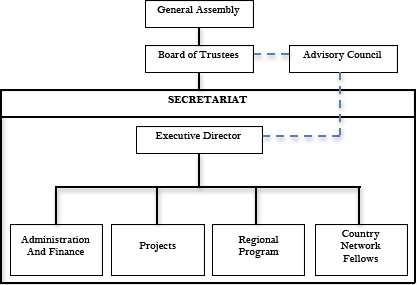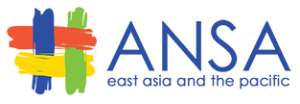The Affiliated Network for Social Accountability–EAP Foundation (ANSA-EAP) is a non-stock, non-profit organization registered in the Philippines. It was initially housed as a program in July 2007 within the Ateneo School of Government (ASoG), a unit of the Ateneo de Manila University. The program was funded by the World Bank’s Development Grant Facility until 2011. ANSA-EAP was subsequently incorporated in March 2011 with five trustees.
The geographic network is composed of seven country convener groups in four countries— Cambodia, Indonesia, Mongolia, and Philippines, and regional thematic networks for public procurement and extractive industries.
ANSA–EAP has counterpart regional networks based in Africa, South Asia, and in the Arab World. They also tap into ANSA-EAP’s expertise and, at the same time, contribute to broadening its pool of knowledge and skills in social accountability.
ANSA–EAP connects citizens and governments to improve governance. Its business is anchored in the organization’s identity as a “networking and learning facility” for networks of SAc practitioners in the East Asia and the Pacific (EAP) region. As such, it reaches out to citizen groups (non-government organizations, civic associations, academic institutions, business sector, and community-based groups), government institutions, media, international development partners, and various other stakeholders. ANSA–EAP promotes constructive engagement with and citizens’ monitoring of the performance of government, specifically, the quality of public service delivery and the transparency of public transactions.
Track Record in the Philippines
ANSA-EAP is the premier civil society organization in the Philippines and in the East Asia Pacific region that comprehensively teaches and uses social accountability concepts and practices as internationally understood and applied. It is the only organization that purposively integrates tools, such as participatory budgeting, public expenditure tracking tool, citizen report card, community scorecard, and particicipatory audit in its projects and initiatives. Among its most innovative and award-winning projects in the Philippines are the Citizen Participatory Audit (CPA) with the Commission on Audit, Check My School (CMS) with the Department of Education, and i-budget.mo with the Caloocan city government in Metro Manila.
As a training provider, ANSA-EAP has the most effective experience in learning module development and delivery in social accountability, particularly its tools. It is Ateneo School of Government’s training arm for the Program to Enhance Capacity for Social Accountability (PECSA) in Cambodia and the Social Accountability Learning-in-Action Program (SACLEAP) in Mongolia. It has also convened various practitioners in the region to learn about the integration of social accountability in the extractive industries. It provides resource speakers to various events, forums, lectures and conferences in the Philippines and abroad.
Specifically, ANSA-EAP has utilized the Community Scorecard (CSC) in the (a) Pantawid program implementation of the Marikina City Government under the Citizen Participatory Audit, (b) Pantawid FDS in Pangasinan under the Enhancing Transparency Impact project, and (c) the extractive industries in four East Asian countries.
Human Resources
ANSA–EAP currently has 21 staff members, of which 8 are male and 13 female. It is a relatively young organization, with 17 staff members below the age of 40. Many have significant experience in the development sector. They come from diverse backgrounds, ranging from Engineering, Business Management, Public Management, Mathematics, Media, Psychology, Philosophy, Communications, Community Development, and Political Science.
Decision Making Process
ANSA-EAP applies participatory decision-making in its operations. All program or project decisions are shared and deliberated with the team members. Decisions arrived at in smaller component groups or outside the bigger team are announced in both face-to-face meetings and/or through email. The Administration and Finance Units assist in program and project implementation based on set guidelines.
Policy and overall strategic direction set by the Board of Trustees level. It has an Advisory Council that may be consulted on matters pertaining to organizational development or its programs.
Organizational Structure
The organizational structure of ANSA–EAP Foundation is as follows:
The General Assembly is the highest decision-making body of the Foundation. The Board of Trustees sets the policy and overall strategic direction of the Foundation. The BOT and the Office of the Executive Director may consult the Advisory Council on some matters about the organization or its programs.
The Office of the Executive Director manages the entire operation of the Secretariat. The Administration and Finance Unit is in charge of the (a) daily operations, office maintenance, and human resource, and (b) budgeting, bookkeeping and financial transactions.
The Projects Unit oversees the development, implementation and assessment of various social accountability projects. The Regional Program Unit manages the implementation of set strategic objectives. For the period 2012-2015, it is divided into country innovations, learning, research, networking and communications, and sustainability. The Country Network Fellows Unit oversees and coordinates the country operations of each Network Fellow. It also identifies and provides technical assistance for the Network Fellows and their partner CSOs.
Finances
ANSA–EAP’s yearly financial capacity, based on the 2014 audited financial report, is at US$529,000. It currently receives funding from donors, such as World Bank, Australian Government, Open Society Foundation, CIVICUS, Hivos, Demand for Good Governance, Partnership for Transparency Fund, and Coffey International.
As a practice, the ANSA–EAP team conducts yearly strategic planning and budgeting in order to set its annual targets. After finalizing, the plan it is submitted to the Board of Trustees for approval.
The Foundation acknowledges the fact that its operations are still donor-driven. Projects that correspond to its strategic objectives are being pursued whenever there is opportunity. In its current plan, financing is targeted to be diversified by exploring revenues from training fees and possible social enterprise application in social accountability
